It’s time to pay (even more) attention!
We all know that we have to be careful when we are dealing with financial matters, especially when we are online.
By Andrew Lawford
This article is published on: 14th January 2026

We all know that we have to be careful when we are dealing with financial matters, especially when we are online.
I appreciate that this isn’t news to anyone, but it is easy to become complacent, as well as to fall behind in our awareness of the sophistication fraudsters have available to them in the era of Artificial Intelligence. I honestly think that we are all vulnerable to frauds, but if we have the humility to admit this, we can better protect ourselves against the most common pitfalls.
I recently watched a webinar made available by Cazenove Capital in the UK and whilst there were things in it that I already knew, I must admit that it also opened my eyes to how frauds are developing as well as reiterating what our best practices should be online and when dealing with financial matters generally.
I would strongly suggest that everyone takes the time to watch the full webinar, but here are a few bullet points that we all need to reflect upon:
For some time now, all Spectrum advisers are required to conduct video calls or in-person meetings when processing withdrawal requests from any investments we intermediate. The fact that withdrawals generally take some time before being paid out also takes away the threat of panicked decisions being made. Of course, one day deep-fake videos will likely become a reality and so even video calls may not be trustworthy, but for today this procedure will protect against all but the most sophisticated fraudsters (and these aren’t the ones who are targeting the likes of us – they will be defrauding multinational institutions).
We must make our job that of being a harder nut to crack compared with those around us. Rather like home security alarms: they will not be sufficient to stop the world’s most sophisticated thief, but they will be enough to make the opportunistic criminal move on to an easier target.
If you find yourself confused or worried about any of the above, please don’t hesitate to give me a call to discuss. The more we are aware of the risks we face, the better we can protect ourselves.
By Portugal team
This article is published on: 12th January 2026

As we begin 2026, it is a natural moment to reflect on the previous year and more importantly, to consider what could shape investment outcomes in the year ahead.
We would like to invite you to a forward-looking webinar designed to provide clarity on the key themes, risks, and opportunities investors may face in the year ahead and to explore the key financial, economic, and policy themes likely to shape 2026.
Date: Tuesday, 20 January 2026
Time: 11:00am (GMT)
Format: Live online webinar
Markets closed 2025 in an unusual position and whilst optimism remains high into 2026, risks are increasingly less obvious, more interconnected and capable of emerging quickly. At the same time, powerful forces such as artificial intelligence, geopolitics, and shifting fiscal and monetary policy continue to reshape global markets.
This webinar is designed to be informative, balanced and accessible – offering clear insights without unnecessary jargon.
There will be time for questions at the end of the webinar, however to avoid disappointment we welcome questions ahead of the session via this link.
Efficient tax planning is about ensuring you pay the right amount, in the right place.
Many people have income arising from many different jurisdictions, whether that be rental, pension or investment income, and each will be treated differently and may even be taxable in different jurisdictions. Even if you believe your situation is relatively simple, there are always planning opportunities and pitfalls as an expat, so it is best to take qualified advice.
We can advise on effective tax-saving structures in your country of residence, restructuring for improved tax efficiency and tax-saving opportunities, whilst ensuring fiscal compliance.
How you hold and structure your wealth can impact how you are taxed on your investment returns, but personalised investment advice is also very important. It must be looked at in the wider context of your total asset base, financial goals, tax residency, your attitude to risk and capacity for loss.
You should also regularly review your investment strategies to ensure ongoing suitability, not only because of the ever- changing nature of investment markets but also because family and personal circumstances change, as well as one’s attitude towards investing. For example, you might be more risk-averse as you near retirement, or you may need to plan for future income or lump sums.
We are supported by internal and external investment specialists and can advise on the most appropriate investment strategy for you and work with you over time to help reach your financial goals.
There is more choice than ever for individuals in respect of their pensions and getting your planning right is critical, as it can have far-reaching consequences.
We are qualified to advise on UK and offshore pension schemes and can offer a wide range of solutions to ensure that your pension planning is right for your retirement goals, lifestyle and country of residence.
Succession planning is decidedly more complicated in Europe, as each country has different rules. These rules not only affect the level of taxation, but who can receive your estate, who pays the tax, and what assets attract tax.
Additionally, many individuals do not realise that they might still have a UK inheritance tax consequence even if they have been living abroad for many years.
We are best placed to look at your position from a multi-jurisdictional perspective, ensuring that your wealth is passed to your loved ones in a simple, controlled and tax-efficient manner.
Trusts are commonly used by families to preserve and protect wealth, and in succession planning.
There are many types of trust and corporate structures and the right one for you and your family, if at all, will be dependent on several factors. Additionally, choosing independent, experienced trustees is also extremely important.
We can guide and advise you on new and existing trust and corporate structures, and their suitability for your personal and family goals.
By Chris Burke
This article is published on: 9th January 2026

Happy New Year and welcome back to the “normal” world – although I’m not entirely sure normal is the right word anymore.
If personal finances had a gym, January would be packed. Some people are here for a quick fix. Others are here to make a lasting difference – those who want their money to work properly for the long term, remain tax-efficient, well organised, and (just as importantly) keep calm along the way.
This month, I’m focusing on why anyone with savings or investments should seek professional advice when managing them – particularly here in Spain.
First of all – congratulations.
Making money is hard. You’ve done that part.
The next phase, however, is less about earning and more about not undoing your own success. This is where managing savings and investments properly really starts to matter – especially in Spain, where tax, structure and timing can quietly erode wealth if left unattended.
Here’s why smart people take wealth management seriously (and no, it’s not because they enjoy spreadsheets).

1. Because “Good Returns” Are Meaningless After Bad Taxes
A portfolio that performs well on paper can look very different after Spanish capital gains tax, wealth tax or the solidarity tax are applied.
Managing investments without considering tax efficiency is like filling a bucket with a small hole in the bottom – it works, but not for long.
Good wealth management isn’t about chasing higher returns. It’s about keeping more of the returns you already have.

2. Because Complexity Grows Faster
Than You Expect
At some point, money stops being “a portfolio” and starts becoming a system:
• different assets
• different jurisdictions
• different timelines
• sometimes different family members
Left unmanaged, complexity creates friction. Managed well, it creates flexibility. The goal isn’t simplicity – it’s clarity and tax efficiency.

3. Because Liquidity Is Underrated (Until It Isn’t)
Most financial problems aren’t investment problems – they’re liquidity problems.
Opportunities appear.
Life happens.
Markets wobble.
When everything is tied up, even good decisions become difficult ones. Smart planning ensures you can act when you want to, not only when you’re forced to.

4. Because Markets Are Emotional – and Humans Are Worse
Even experienced investors aren’t immune to poor timing, overconfidence or “just this once” decisions.
A structured, disciplined approach removes emotion from decisions that should be boring, deliberate and repeatable.
Ironically, the less exciting your financial strategy feels – supported by knowledge and research – the better it usually performs.

5. Because Wealth Should Support Your Life, Not Complicate It
Well-managed wealth should reduce stress, not add to it.
It should support your lifestyle, your family and your long-term plans – whether that’s freedom, security or simply peace of mind.
If managing your money feels like a second job, something isn’t working properly.

6. Because Spain Has Rules (Quite a Few of Them)
Spain is a wonderful place to live – and a nuanced place to manage wealth.
From wealth and succession taxes to residency and reporting obligations, the details matter. Ignoring them doesn’t make them go away; it just makes them more expensive later.
Good planning is proactive. Bad planning is retrospective.
Managing your savings and investments well isn’t about being aggressive, clever or constantly active.
It’s about being intentional.
You’ve already done the hard part by building wealth. Managing it properly is how you ensure it continues to work for you – quietly, efficiently and for a long time.
Many people only review their financial strategy after something changes: markets, regulations, residency or family circumstances. The most effective planning tends to happen before it’s needed.
If you ever feel it would be useful to sense-check your current approach, explore alternatives or simply have a thoughtful conversation about how your wealth is structured, I’m always happy to do so – discreetly and without obligation.
Sometimes clarity starts with a conversation.
You can arrange an initial consultation to explore your situation [here]. You can also [read independent reviews of my advice and service here].
By Katriona Murray-Platon
This article is published on: 7th January 2026

Happy New Year!! I wish you all the very best for 2026. I hope that you had an enjoyable festive season. We spent Christmas at home, which was very nice and relaxing, so now I am well rested, ready for the new year and looking forward to seeing all my clients.
On 9th December the Law for the Financing of the Social Security was adopted by the National Assembly and, pending any issues with the Constitutional Court, it is now enacted into law. Under this law, the official retirement age is now 62 years and 9 months, with a required contribution of at least 170 semesters set until 1st January 2028 for pensions taking effect from 1st September 2026. As a result, anyone born between 1964 and 1968 may retire 3 months earlier than previously expected. Furthermore, as from 1st January 2026, the French state pension increased by 0.9%.
This law also increased the CSG social charges on interest, dividends and capital gains from 9.2% to 10.6%. The flat tax (PFU) on this income has therefore risen from 30% to 31.4%. However, withdrawals from assurance vie policies, PEL and PEP (plan épargne populaires) accounts, rental income and capital gains on property are not affected. So for people with money in UK saving accounts, the interest will now be taxed more heavily in France. It is worth considering whether it remains appropriate to keep such accounts, or whether it would be more tax-efficient to move funds into French savings vehicles such as a Livret A or LDDS, or into an assurance vie for longer-term planning.
If you have up to €61,200 that you need to put away for a year or two, a PEL account opened from 1st January 2026 now offers an interest rate of 2% compared with 1.75% for PELs opened after 1st January 2025. The interest rate for a PEL is determined at the time the account is opened.

From 1st January 2026, cash gifts now need to be declared online via your account on the impots.gouv.fr website. This applies to gifts of money, shares or valuable items such as a car. You will be asked to declare any money or gifts of value and state whether they fall under the €100,000 allowance between parents and children or the €31,865 made by a relative under 80 years old to a recipient who is over 18 years old. If the recipient is a minor, their parents should do the declaration for them on their online account. Christmas gifts remain exempt and do not need to be declared.
Since 1st December 2025, parents who are divorced or separated, will now both receive childcare benefit (complement de libre choix de garde) provided the child is cared for by a registered childminder either at the childminder’s home or at the child’s home.
For those looking for a bargain or waiting to buy something special, the sales in France will begin on Wednesday 7th January at 8am and will continue until Tuesday 3rd February.

If you are considering choosing an electric vehicle for your next car, the good news is that government incentives will continue in 2026.
Low-income households may receive a bonus of €5,700, middle-income households €4,700, and all other buyers €3,500, when purchasing a brand-new electric car.
An additional bonus of between €1200 and €2000 may also be granted if the battery of the car was manufactured in Europe.
Furthermore the thresholds for what is considered a low income and middle income households have been increased.
Later this month, I will be attending our annual conference in Monaco with colleagues and meeting with our product providers to review the past year and discuss the factors likely to influence investment strategies in 2026. I will share key insights from our conference in the next Ezine.
In the meantime, if you have any questions about the topics above or would like to discuss your personal financial situation, please do not hesitate to get in touch to arrange a free phone call or meeting.
By Peter Brooke
This article is published on: 25th December 2025
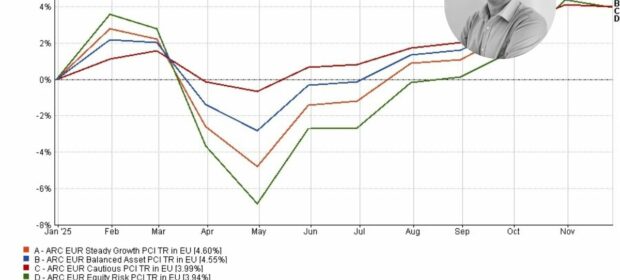
As we come to the end of the year, we wanted to share a brief reflection on what has been a challenging but ultimately rewarding period for investors.
It’s been another unusual year (I think I wrote that in my last Christmas newsletter!!). We began 2025 with talk of a Trump tariff driven recession, interest rate cuts and the end of US dollar dominance. Instead, growth has slowed but not collapsed, interest rates have stayed higher for longer, and after weakening early in the year, the US dollar has strengthened again in the second half of 2025.
Equities experienced volatility along the way, driven by geopolitics, policy changes and concerns around inflation. Despite this, strong company earnings — particularly in technology and AI — helped global markets finish the year close to record highs. This was a reminder of the value of staying invested through short-term uncertainty.
Bonds quietly did their job. While yields rose earlier in the year, they provided attractive income and stability, reinforcing their role as a key diversifier within portfolios.
Gold stood out as a strong performer, offering effective protection against geopolitical and economic uncertainty while contributing positively to returns.
Overall, 2025 reinforced an important lesson: diversified, multi-asset portfolios can help investors navigate uncertainty and capture long-term opportunities — even in unsettled markets.
You’ll see below a chart showing the ARC Euro Indices for this year; the movements reflect the periods of volatility investors experienced, especially post ‘Liberation Day’ followed by a recovery as confidence improved.
It’s a helpful visual reminder that while markets rarely move in a straight line, staying invested through the ups and downs has historically been key to achieving long-term outcomes.
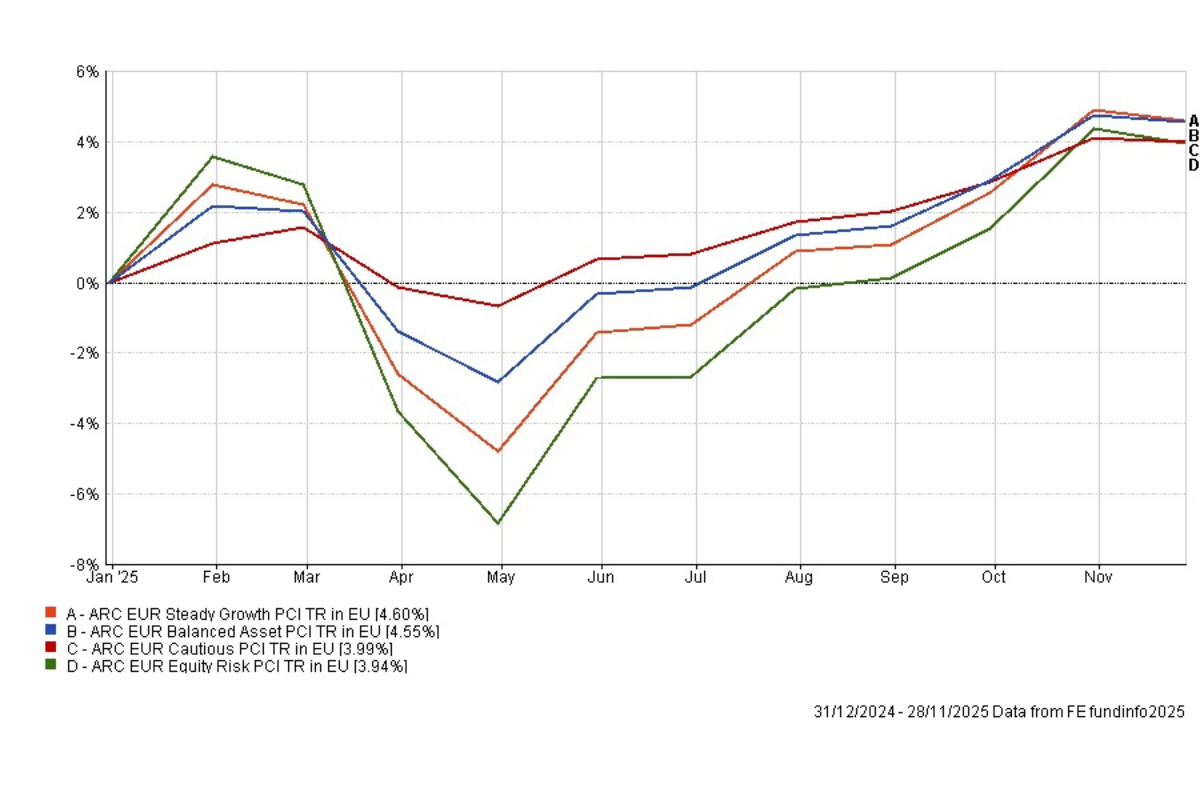
As we head into the festive season, I’d like to thank you for your continued trust and wish you and your family a very happy Christmas and a healthy, prosperous New Year.
I will be back in touch in January with a financial outlook for 2026 following our next annual Spectrum conference and, of course, I plan to continue to provide you with updates, developments and new support tools over the year ahead…

By Gareth Horsfall
This article is published on: 24th December 2025

I am hoping for a new set of wellies this year because the emergency pair I bought when we purchased the property didn’t last very long at all.
I sent out a not-so-subtle message to my wife and so I hope my Christmas wish comes true.
I will then be able to also complete my true Yorkshire look in Umbria.
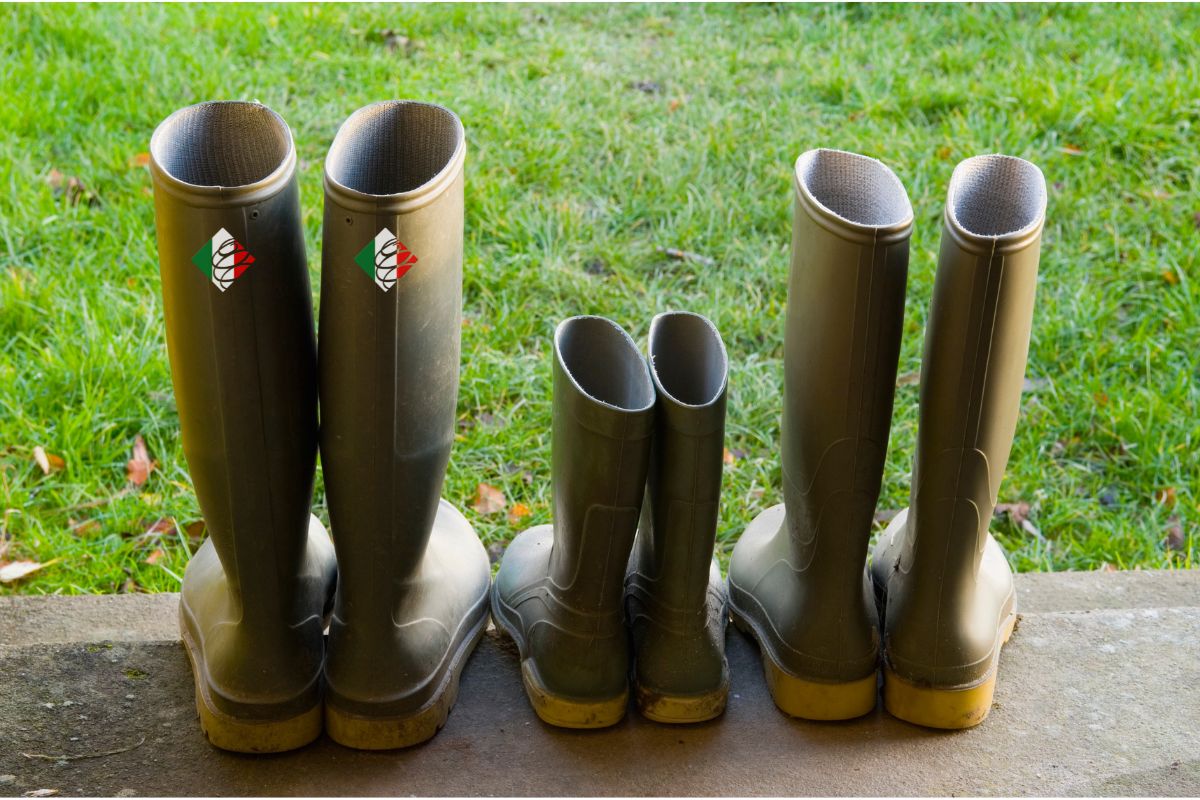
I hope you have a very Merry Christmas and Happy New Year, whatever you are doing.
We will be relaxing at home this year. My Mum has just been for a few days to visit (she hasn’t seen the house since June 2024 when we were in the phase of renovation) and so it was good for her to see it for herself. We are now on our own, but have lots of fun things planned. My son will be playing in the local Pasticceria Russo, in Amelia, this evening (23rd) , playing one of his newly learned Beethoven classical piano pieces.
The Pasticceria is becoming a bit of a focal point for us in the area (as it seems to be for alot of other people as well) and they have their amazing range of sweets and Panettone artiginale, which is a little bit too more-ish for my liking. I am trying my best to resist the temptation and am doing OK, until now! The only way to combat that is to engage in more physical land work anyway. As many of you have told me since we moved here: ‘there is always work to do on the land’.
It will keep me out of trouble until I am back into work full-time in the New Year.

By Jozef Spiteri
This article is published on: 17th December 2025

The Nations Cup got off to a lively start with a competitive and hard-fought opening round, quickly giving us a first look at how this year’s tournament might shape up.
The Rest of the World set the early pace with a strong all-round showing, claiming a 5–1 win over Malta. Solid performances across the matches helped them build momentum early and turn it into a clear advantage on the scoreboard.
Hot on their heels, the Scandis & Nordics produced a calm and efficient display to secure a 4½–1½ victory against GB & I. As defending champions, they looked composed and well organised, keeping themselves firmly in the mix from the outset.
GB & I showed flashes of quality but couldn’t quite swing the matches their way, while Malta faced a tough opening test. Both teams, though, will be keen to bounce back as the next rounds get underway. Next matchday will be on 1st February.
The Spectrum IFA Group is once again proudly supporting the tournament and Craig and Jozef were there on the day to present Spectrum’s offering. With Round One complete and plenty of action already on the board, the stage is set for an exciting and closely contested competition as it continues.
Taking place at the lovely Royal Malta Golf Club – the 3 matchday competition launching in December 2025 between teams representing Malta, GB & I, Scandinavia and Nordics and The Rest.

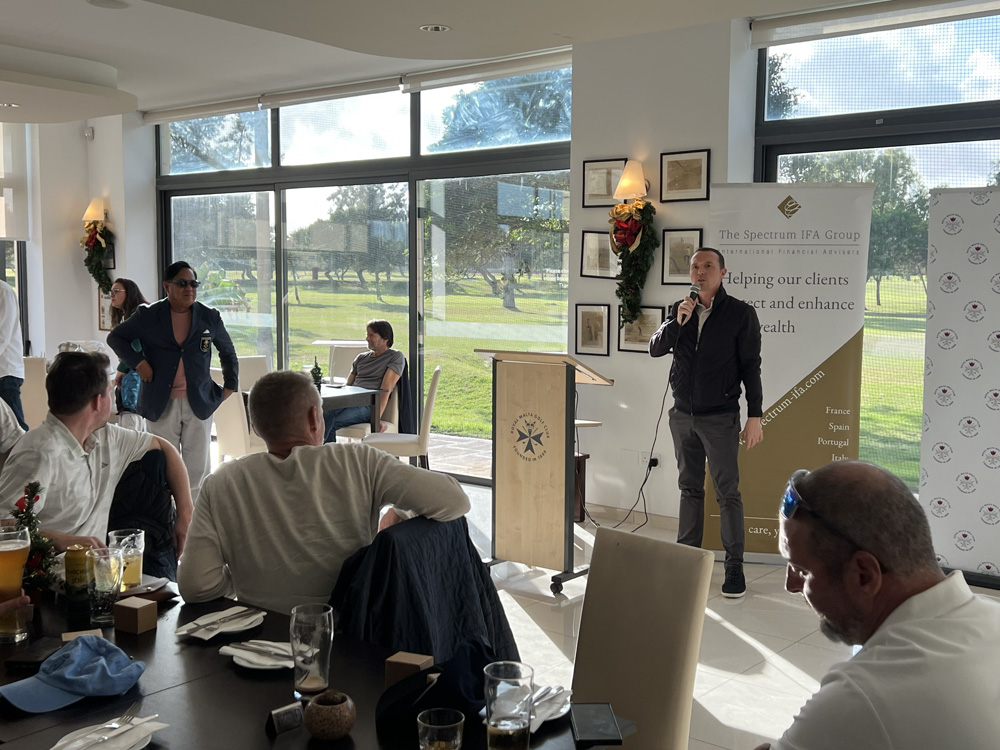
By Barry Davys
This article is published on: 17th December 2025

The Intra-Company Transfer (ICT) Visa is designed for non-EU employees of multinational companies who are being temporarily transferred to a branch, subsidiary, or client in Spain. It is intended for managerial, technical, or highly specialised staff.

Obtaining your visa is a crucial step, but understanding the financial implications of your relocation is just as important.
Many ICT applicants ask whether they can access the Beckham Law and how this could affect their tax position. While the widely advertised 24% tax rate on earnings up to €600,000 per year is the most visible element, there is another significant benefit that can greatly reduce your tax bill for the entire five-year period of the regime.
At The Spectrum IFA Group, our advisers combine professional expertise with first-hand experience, having each gone through the relocation process themselves. We help clients optimise their finances and make informed decisions before and after moving to Spain.
While we specialise in financial planning, we are not immigration lawyers. For visa matters, we work closely with Klev & Vera, a respected Barcelona-based law firm led by managing partner Anna Klevtsova, who holds degrees in International Law from both the UK and Spain.
This collaboration ensures clients receive:
For full transparency: we do not accept commissions or referral fees from these lawyers. Our priority is that clients receive accurate, high-quality advice.
By Barry Davys
This article is published on: 10th December 2025

The Highly Qualified Professional Visa is designed for non-EU professionals with specialist skills who have been recruited to work in Spain, particularly in high-demand sectors such as technology, engineering, and research.

Securing your visa is a major milestone — but it’s equally important to understand how relocating to Spain will affect your finances.
Many applicants ask whether they can join the Beckham Law while on the HQP Visa, and what this could mean for their tax position. While the well-known 24% tax rate on employment income up to €600,000 is widely published, there is another significant benefit that can substantially reduce your tax bill for the entire five-year duration of the scheme.
At The Spectrum IFA Group, our advisers are both professionally qualified and personally experienced in moving to and living in Spain. We help clients understand how to structure their finances efficiently from day one.
HQP Visa not suitable? View other visa options for British nationals.

While we are experts in financial planning, we are not visa specialists. For immigration matters, we work closely with Klev & Vera, a Barcelona-based law firm led by managing partner Anna Klevtsova, who holds degrees in International Law from both the UK and Spain.
Our collaboration ensures clients receive clarity on:
For transparency: we do not receive any commission or fees from these lawyers. Our priority is that clients receive accurate, reputable advice.
You may be able to reduce your tax burden by opting to be taxed under the special non-resident tax regime (Beckham Law) if you meet the following conditions:
You may qualify for the regime under any of the following employment structures:
Each pathway has specific requirements, so professional tax advice is essential to confirm eligibility before relocating. We work with specialist tax lawyers who can assess your circumstances — and again, we do not receive any form of commission for referring clients.
By Barry Davys
This article is published on: 8th December 2025
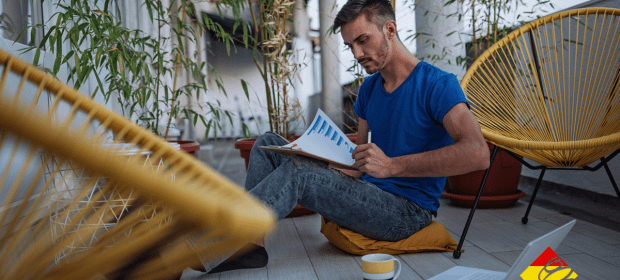
A residence permit for non-EU remote workers and freelancers who wish to live in Spain while working for companies outside the country.

Your Visa is an important step for your move to Spain. At the same time, it is very important to have an understanding of how your finances will be affected when you move to Spain. For example, can you join the Beckham Law on the Digital Nomad Visa? What will this mean for your financial position? Whilst the 24% tax rate on earnings up to €600,000 pa is the most posted part of the rule on the internet, there is another very important benefit. This second benefit can hugely reduce your tax bill when moving to Spain and for the whole five tax years you are on the scheme,
At The Spectrum IFA Group in Spain, we are familiar with these opportunities both from our professional knowledge and our own experience of all our advisers having made the same move and who now live in Spain.
Case Study, How we helped a Spanish Tax Resident Couple after they moved to Spain
Why a financial adviser is essential for expats living in Spain
The DNV not suitable for you? See all the other available Visas for Spain for British nationals here
Whilst we are experts in our own field, we readily admit we are not experts in Visas. We, therefore, work with Visa lawyers at Klev & Vera, based in Barcelona. The firm is led by managing partner Anna Klevtsova with whom we have worked with for a number of years. Anna has a degree in International Law from the UK and a Masters degree in International Law in Spain.
The result has been clarity for clients moving to Spain on what type of visa is right for them, help with applying for the visa and availability to deal with ongoing matters such as the Spanish state pension.